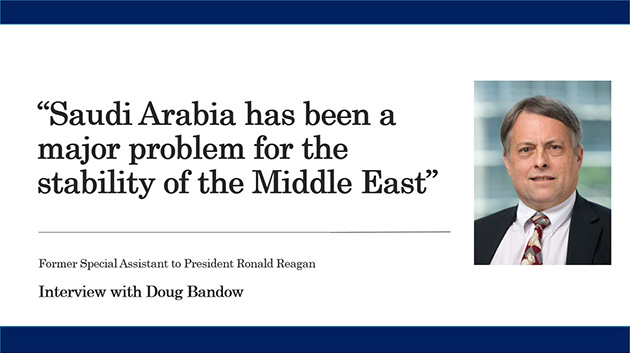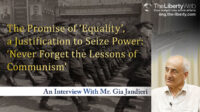Saudi Arabia has been a major problem for the stability of the Middle East: An Interview with Doug Bandow

Doug Bandow is a senior fellow at the Cato Institute, specializing in foreign policy and civil liberties. He worked as a special assistant to President Ronald Reagan and was the editor of the political magazine Inquiry. He writes regularly for leading publications such as Fortune magazine, National Interest, the Wall Street Journal, and the Washington Times. He holds a JD from Stanford University.
As the situation in the Middle East becomes increasingly dire, we had an interview with a diplomatic expert, Daugh Bandow.
――Regarding the Iranian issue, you have criticized the Trump administration, especially the former National security adviser, John Bolton. What should the US policies on the Middle East be?
Doug Bandow (Bandow): The Unites States needs a much more balanced policy. They should not be taking the side of Saudi Arabia, which I think in many ways is actually more dangerous than Iran.
Saudi Arabia’s attack on Yemen was blatant aggression for power politics reasons and it has been a humanitarian catastrophe. The crown prince of Saudi Arabia actually kidnapped the prime minister of Lebanon, which was an extraordinary incident. Saudi Arabia has been very repressive at home and it has gotten much worse under Crown Prince Mohammad bin Salman. And we certainly saw that with the murderer and dismemberment of Jamal Khashoggi, a Saudi Arabian journalist.
Equally bad things have been done within Saudi Arabia itself. Saudis have supported radical insurgents in Syria and also promoted the civil war in Libya. Saudi Arabia has also supported very repressive governments in Bahrain and Egypt. Over the years, it has subsidized the promotion of a very conservative form of fundamentalist Islam called Wahhabism, which is very intolerant and commits violence against non-Muslims.
So Saudi Arabia has been a major problem when it comes to Middle Eastern stability.
――The US government accuses Iran of creating confusion in Middle East.
Bandow: Unfortunately, the US government is not trustworthy in this regard. Almost everyone is aware that what the George W Bush administration did was essentially to lie to Americans to start a war with Iraq.
Regarding the attack on Saudi Arabia’s oil facilities, the US government has to come up with some serious evidence if it wants to blame Iran. I think it’s quite reasonable for other countries to demand that the United States provides real proof as opposed to a simple allegation of Iranian involvement. I know the Japanese government so far is not satisfied with what it is seeing and its skepticism is very proper.
――Historically, the US has stood for Israel. What do you think about that from the standpoint of fairness?
Bandow: Unfortunately the Netanyahu government appears to be devoted to destroying the possibility of a two-state solution and the Trump administration has been helpful in that regard. My hope is that there might be a new administration that will be more positive towards the possibility of peace with Palestine. Then, the US government would be willing to work with it to try to recognize the legitimate aspirations of the Palestinian people.
――You insist on withdrawal of troops from Japan and South Korea. We also believe independent countries should protect their citizens by themselves. What’s your reasoning on this?
Bandow: Because I don’t believe it is America’s job to defend essentially everyone else on earth that wants America to defend them.
The US currently is supposed to defend European countries. It is supposed to defend Asian countries. It is supposed to defend Middle Eastern countries, but the United States can’t afford to do so and it’s an unfair burden on the American people. Seventy years after the end of World War Two, wealthy, industrialized friends of the United States should be able to defend themselves. It makes no sense in my view to expect the US to forever support wealthy countries that frankly spend far less on their militaries. Those are choices they are quite free to make. It is not America’s job to tell other countries how much to spend on their militaries and it makes no sense for the Unites States to have to spend more to defend countries that choose to spend less.
――You have mentioned the nuclear armament of South Korea. Do you think it is natural for Japan to go nuclear too?
Bandow: Obviously a decision to develop nuclear weapons would be highly controversial in both the ROK (Republic of Korea) and Japan.
However, I think that this is a decision this should be up to those countries, but again, the question is how to best defend them. Today, the Unites States extends what we call a nuclear umbrella over them: America says they are prepared to use their nuclear weapon and potentially be attacked by nuclear weapons to defend those countries. I don’t see why the United States should be willing to take that risk especially if North Korea develops nuclear weapons and missiles capable of hitting the United States. There is nothing at stake that warrants the United States risking a nuclear exchange over its allies and they should be making their decision based on how best to defend themselves, not expecting it to come from the United States.
――How about article 9 of the Japanese constitution?
Bandow: This is an issue for Japan. This is not an issue for the United States.
The Japanese government has been creative in interpreting article 9 to allow the creation of the self-defense forces. As in America, I would not tell Japan what to do. I would simply explain to Japan what the US is prepared to do. That would be one that the United States should not have to spend three and a half or four percent on its military, while Japan spends just one percent, if the US is supposed to defend Japan against China.
China is a significant threat and in fact, Japan should do more. It’s up to Japan, however, not the United States. When it comes to constitutional reform issues, these are very clearly decisions to be made by the Japanese people. I don’t believe the US should be lecturing Japan on what it’s doing. I think what the Unites States should do is simply explain what it is prepared to do and indicate that anything else needs to come from Japan, South Korea or Europe as opposed to relying on America.
――Thank you.



















